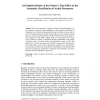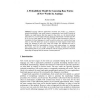33 search results - page 4 / 7 » Spelling-checking for Highly Inflective Languages |
EMNLP
2007
13 years 10 months ago
2007
This paper proposes a new bootstrapping approach to unsupervised part-of-speech induction. In comparison to previous bootstrapping algorithms developed for this problem, our appro...
CICLING
2010
Springer
13 years 3 months ago
2010
Springer
The Arabic language is a highly flexional and morphologically very rich language. It presents serious challenges to the automatic classification of documents, one of which is deter...
CICLING
2008
Springer
13 years 10 months ago
2008
Springer
Language software applications encounter new words, e.g., acronyms, technical terminology, loan words, names or compounds of such words. Looking at English, one might assume that t...
DEXAW
2007
IEEE
14 years 2 months ago
2007
IEEE
We present an automatic semantic annotation system for Korean based on the Contextual Exploration Method. Creating a morphological analyzer and part-of-speech tagger for the Korea...
LREC
2008
13 years 10 months ago
2008
Basque is a highly inflected and agglutinative language (Alegria et al., 1996). Two-level morphology has been applied successfully to this kind of languages and there are two-leve...


